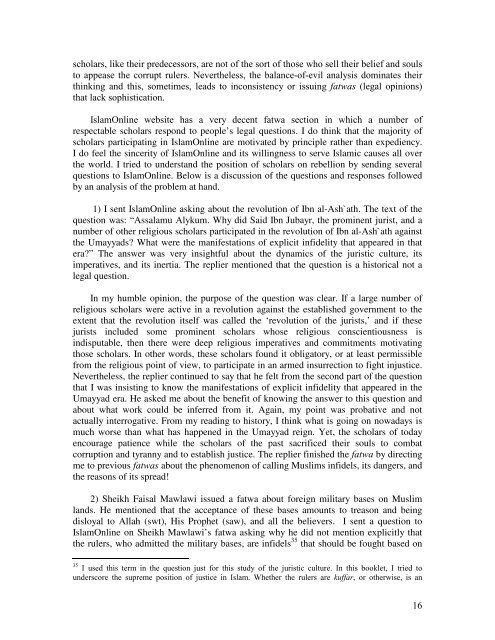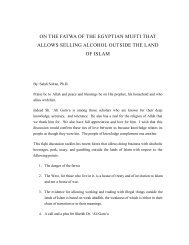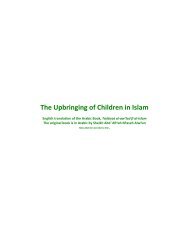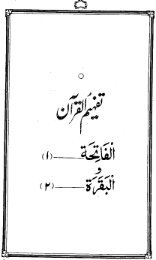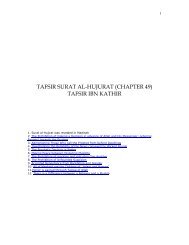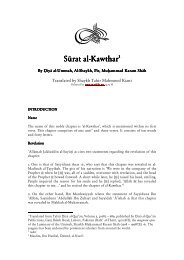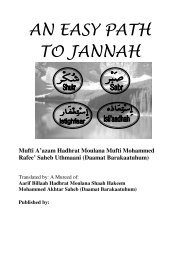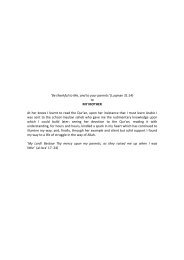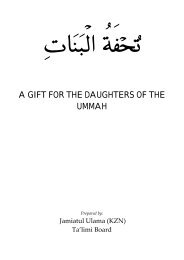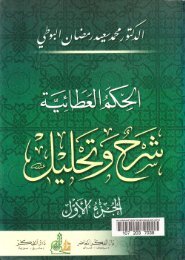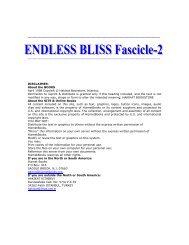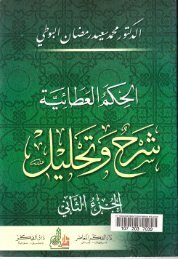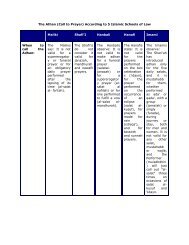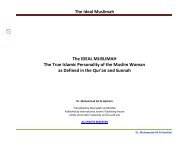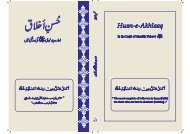Rebellion and Civil Disobedience in Islam The Need for a Paradigm ...
Rebellion and Civil Disobedience in Islam The Need for a Paradigm ...
Rebellion and Civil Disobedience in Islam The Need for a Paradigm ...
Create successful ePaper yourself
Turn your PDF publications into a flip-book with our unique Google optimized e-Paper software.
scholars, like their predecessors, are not of the sort of those who sell their belief <strong>and</strong> soulsto appease the corrupt rulers. Nevertheless, the balance-of-evil analysis dom<strong>in</strong>ates theirth<strong>in</strong>k<strong>in</strong>g <strong>and</strong> this, sometimes, leads to <strong>in</strong>consistency or issu<strong>in</strong>g fatwas (legal op<strong>in</strong>ions)that lack sophistication.<strong>Islam</strong>Onl<strong>in</strong>e website has a very decent fatwa section <strong>in</strong> which a number ofrespectable scholars respond to people’s legal questions. I do th<strong>in</strong>k that the majority ofscholars participat<strong>in</strong>g <strong>in</strong> <strong>Islam</strong>Onl<strong>in</strong>e are motivated by pr<strong>in</strong>ciple rather than expediency.I do feel the s<strong>in</strong>cerity of <strong>Islam</strong>Onl<strong>in</strong>e <strong>and</strong> its will<strong>in</strong>gness to serve <strong>Islam</strong>ic causes all overthe world. I tried to underst<strong>and</strong> the position of scholars on rebellion by send<strong>in</strong>g severalquestions to <strong>Islam</strong>Onl<strong>in</strong>e. Below is a discussion of the questions <strong>and</strong> responses followedby an analysis of the problem at h<strong>and</strong>.1) I sent <strong>Islam</strong>Onl<strong>in</strong>e ask<strong>in</strong>g about the revolution of Ibn al-Ash`ath. <strong>The</strong> text of thequestion was: “Assalamu Alykum. Why did Said Ibn Jubayr, the prom<strong>in</strong>ent jurist, <strong>and</strong> anumber of other religious scholars participated <strong>in</strong> the revolution of Ibn al-Ash`ath aga<strong>in</strong>stthe Umayyads? What were the manifestations of explicit <strong>in</strong>fidelity that appeared <strong>in</strong> thatera?” <strong>The</strong> answer was very <strong>in</strong>sightful about the dynamics of the juristic culture, itsimperatives, <strong>and</strong> its <strong>in</strong>ertia. <strong>The</strong> replier mentioned that the question is a historical not alegal question.In my humble op<strong>in</strong>ion, the purpose of the question was clear. If a large number ofreligious scholars were active <strong>in</strong> a revolution aga<strong>in</strong>st the established government to theextent that the revolution itself was called the ‘revolution of the jurists,’ <strong>and</strong> if thesejurists <strong>in</strong>cluded some prom<strong>in</strong>ent scholars whose religious conscientiousness is<strong>in</strong>disputable, then there were deep religious imperatives <strong>and</strong> commitments motivat<strong>in</strong>gthose scholars. In other words, these scholars found it obligatory, or at least permissiblefrom the religious po<strong>in</strong>t of view, to participate <strong>in</strong> an armed <strong>in</strong>surrection to fight <strong>in</strong>justice.Nevertheless, the replier cont<strong>in</strong>ued to say that he felt from the second part of the questionthat I was <strong>in</strong>sist<strong>in</strong>g to know the manifestations of explicit <strong>in</strong>fidelity that appeared <strong>in</strong> theUmayyad era. He asked me about the benefit of know<strong>in</strong>g the answer to this question <strong>and</strong>about what work could be <strong>in</strong>ferred from it. Aga<strong>in</strong>, my po<strong>in</strong>t was probative <strong>and</strong> notactually <strong>in</strong>terrogative. From my read<strong>in</strong>g to history, I th<strong>in</strong>k what is go<strong>in</strong>g on nowadays ismuch worse than what has happened <strong>in</strong> the Umayyad reign. Yet, the scholars of todayencourage patience while the scholars of the past sacrificed their souls to combatcorruption <strong>and</strong> tyranny <strong>and</strong> to establish justice. <strong>The</strong> replier f<strong>in</strong>ished the fatwa by direct<strong>in</strong>gme to previous fatwas about the phenomenon of call<strong>in</strong>g Muslims <strong>in</strong>fidels, its dangers, <strong>and</strong>the reasons of its spread!2) Sheikh Faisal Mawlawi issued a fatwa about <strong>for</strong>eign military bases on Musliml<strong>and</strong>s. He mentioned that the acceptance of these bases amounts to treason <strong>and</strong> be<strong>in</strong>gdisloyal to Allah (swt), His Prophet (saw), <strong>and</strong> all the believers. I sent a question to<strong>Islam</strong>Onl<strong>in</strong>e on Sheikh Mawlawi’s fatwa ask<strong>in</strong>g why he did not mention explicitly thatthe rulers, who admitted the military bases, are <strong>in</strong>fidels 35 that should be fought based on35 I used this term <strong>in</strong> the question just <strong>for</strong> this study of the juristic culture. In this booklet, I tried tounderscore the supreme position of justice <strong>in</strong> <strong>Islam</strong>. Whether the rulers are kuffar, or otherwise, is an16


